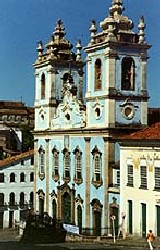About Brazil
Physical, Political and Economical Aspects: Brazil is the biggest country in Latin America. It covers almost half of the Latin America Continent (47.3%) with an area of 8.5 millions of km². In area, it is one of the largest countries in the world (82% the area of all Europe and 89% the area of the US). Except for a small amount of islands, Brazil is constituted by a whole and continuous territorial extension. On the world map you can observe that the shape of the east contour of Brazil is in conformity of the concave curve of west of Africa. The Equator Line crosses the North region of the country, next to Macapá; the Tropic of Capricorn crosses the South of the country, next to Sao Paulo.
Its extension on the east-west direction (4,319.4Km) is almost equivalent to its major distance on the north-south direction (4,394.7Km). Brazil has its borders with ten countries: French Guiana, Suriname, Guiana, Venezuela and Colombia north frontier; Uruguay and Argentine, to the south; Paraguay, Bolivia and Peru, to the west. Ecuador and Chile are the only countries of South American Continent with which Brazil has no frontiers. The Atlantic Ocean extends along all its east coast coming up with 7,367Km of coastal waters.
The total population is about 180 million and the most important cities are Porto Alegre (2.0 million) in the southern region, São Paulo (15 million) and Rio de Janeiro (6.0 million) both in the southeast, Belo Horizonte (2.8 million) in the southwest but not along the coast, Salvador (3.0 million), Fortaleza (2.7 million) and Recife (2.6 million), these three in the northeast region. The capital, Brasilia (1.8 million) is in the center of the country.
The country is politically divided into 27 states, each one with less autonomy than the similar ones in the US.Language:
Portuguese is the national language, but the Portuguese spoken in Brazil is different from that spoken in Portugal and Old Portuguese Colonies, with differences of the intonation and accents. Mostly in touristic areas and touristic activities, it is easy to find people able to speak English.
Some people say that Brazilians, nowadays, speak "brasileiro", the same way Americans could say they speak "American" and not English. There are Brazilians who speak German and Italian, mainly on the south cities of Brazil, as a result of the colonization influences. Salvador, particularly, has a tradition of Spanish immigration, with many Spanish descendants involved in specific activities in the city.Currency:
The Brazilian currency is the REAL. Its present value (July 2008) against US$ and Euros is about:
US$ 1.00 = R$ 1.70
€$ 1.00 = R$ 2.50
The inflation rate in Brazil in recent years has ranged from 3 to 6% a year. This figure not necessarily corresponds to the variation against the US$.All payments are made in reais so we suggest that, on arrival, you get some local money.
Majos credit cards are accepted everywhere.
The State: BAHIA
The state economy depends on industrial activities (petrochemicals and some consumer goods), agriculture (cocoa, soya beans, fruits) as well as cattle farms. Tourism is also an important aspect of the local economy, not just in the capital but also along the coastal area of the state.
